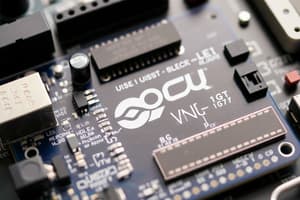Podcast
Questions and Answers
Which loop structure repeats a block of code a specific number of times?
Which loop structure repeats a block of code a specific number of times?
- for loop (correct)
- while loop
- do-while loop
- switch case
What is the baud rate in serial communication?
What is the baud rate in serial communication?
9600 bps
Which function is used to initialize serial communication in Arduino?
Which function is used to initialize serial communication in Arduino?
Serial.begin()
A potentiometer is often used to:
A potentiometer is often used to:
What is the range of values that an analogRead() function can return?
What is the range of values that an analogRead() function can return?
What is the maximum voltage that a digital pin on an Arduino board can handle?
What is the maximum voltage that a digital pin on an Arduino board can handle?
To turn an LED on, we typically write _____ value to the digital pin?
To turn an LED on, we typically write _____ value to the digital pin?
What is the purpose of the pinMode() function in Arduino?
What is the purpose of the pinMode() function in Arduino?
Which of the following is NOT a fundamental component of an Arduino circuit?
Which of the following is NOT a fundamental component of an Arduino circuit?
What is the primary purpose of the setup() function in an Arduino sketch?
What is the primary purpose of the setup() function in an Arduino sketch?
Which of the following is NOT a data type supported by Arduino?
Which of the following is NOT a data type supported by Arduino?
What is the difference between a digital pin and an analog pin?
What is the difference between a digital pin and an analog pin?
What is the purpose of the Serial.print() function?
What is the purpose of the Serial.print() function?
What symbol is used to increment a value by 1 in Arduino?
What symbol is used to increment a value by 1 in Arduino?
What symbol is used for subtraction in Arduino?
What symbol is used for subtraction in Arduino?
What symbol is used to multiply a value by a variable and assign the result to the variable in Arduino?
What symbol is used to multiply a value by a variable and assign the result to the variable in Arduino?
What symbol is used to check if a value is less than another in Arduino?
What symbol is used to check if a value is less than another in Arduino?
What symbol is used to check if a value is less than or equal to another in Arduino?
What symbol is used to check if a value is less than or equal to another in Arduino?
What symbol is used to check if a value is greater than or equal to another in Arduino?
What symbol is used to check if a value is greater than or equal to another in Arduino?
What symbol is used to check if a value is greater than another in Arduino?
What symbol is used to check if a value is greater than another in Arduino?
What symbol is used for logical OR in Arduino?
What symbol is used for logical OR in Arduino?
What symbol is used to add a value to a variable and assign the result to the variable in Arduino?
What symbol is used to add a value to a variable and assign the result to the variable in Arduino?
What symbol is used to divide a value by a variable and assign the result to the variable in Arduino?
What symbol is used to divide a value by a variable and assign the result to the variable in Arduino?
What symbol is used to check for inequality in Arduino?
What symbol is used to check for inequality in Arduino?
What symbol is used for addition in Arduino?
What symbol is used for addition in Arduino?
What symbol is used for modulo (remainder after division) in Arduino?
What symbol is used for modulo (remainder after division) in Arduino?
What symbol is used to subtract a value from a variable and assign the result to the variable in Arduino?
What symbol is used to subtract a value from a variable and assign the result to the variable in Arduino?
What symbol is used for multiplication in Arduino?
What symbol is used for multiplication in Arduino?
What is the purpose of the delay() function?
What is the purpose of the delay() function?
What is the difference between digitalWrite() and digitalRead()?
What is the difference between digitalWrite() and digitalRead()?
What is the purpose of the map() function in Arduino?
What is the purpose of the map() function in Arduino?
Which library is commonly used for controlling servos in Arduino?
Which library is commonly used for controlling servos in Arduino?
What is the primary function of the millis() function?
What is the primary function of the millis() function?
What is the purpose of the if statement?
What is the purpose of the if statement?
What is the difference between a for loop and a while loop?
What is the difference between a for loop and a while loop?
Flashcards
Relay Module
Relay Module
A device that controls electrical circuits using a low-power signal, often used for switching higher power loads.
Arduino Uno Board
Arduino Uno Board
A microcontroller board based on the ATmega328P processor, commonly used for building interactive electronic projects.
Ultrasonic Sensor
Ultrasonic Sensor
A sensor that uses sound waves to measure distance.
Piezo Buzzer
Piezo Buzzer
Signup and view all the flashcards
Light Emitting Diode (LED)
Light Emitting Diode (LED)
Signup and view all the flashcards
RGB LED
RGB LED
Signup and view all the flashcards
Analog Joystick
Analog Joystick
Signup and view all the flashcards
Resistor
Resistor
Signup and view all the flashcards
Light Dependent Resistor (LDR)
Light Dependent Resistor (LDR)
Signup and view all the flashcards
Liquid Crystal Display (LCD)
Liquid Crystal Display (LCD)
Signup and view all the flashcards
Infrared Receiver
Infrared Receiver
Signup and view all the flashcards
BREADBOARD
BREADBOARD
Signup and view all the flashcards
7 Segment Display
7 Segment Display
Signup and view all the flashcards
Potentiometer
Potentiometer
Signup and view all the flashcards
Motion Sensor
Motion Sensor
Signup and view all the flashcards
Servo Motor
Servo Motor
Signup and view all the flashcards
Push-Button
Push-Button
Signup and view all the flashcards
Humidity Sensor
Humidity Sensor
Signup and view all the flashcards
Study Notes
Electronic Components and Modules
-
Relay Module: A component used to switch electrical circuits, typically controlling high-power loads. Features input, output, voltage, and ground indicators.
-
Arduino Uno Board: A microcontroller board based on the ATmega328P processor, commonly used in hobbyist electronics projects. Has digital and analog input/output pins.
-
Ultrasonic Sensor: A device measuring distance by emitting ultrasonic waves and measuring the time taken for the signal to return. Features trigger and echo pins.
-
Piezo Buzzer: A small transducer producing sound when an electrical signal is applied. Typically used for alerts or feedback.
-
Light Emitting Diode (LED): A semiconductor device emitting light when an electric current passes through it. A common indicator or signaling device.
-
RGB LED: A light emitting diode that can display a range of colors by combining red, green, and blue light.
-
Analog Joystick: A control device with buttons for input, often used for controlling movement in games or applications.
-
Resistor: A passive electronic component that resists the flow of current. Its resistance is measured in ohms.
-
Liquid Crystal Display (LCD): A flat-panel display showing alphanumeric characters or images using liquid crystals.
-
4x4 Keypad: A rectangular input matrix for entry of numbers and alphanumeric characters.
-
IR Remote: A device that transmits infrared signals to control electronic devices remotely.
-
Light Dependent Resistor (LDR): A resistor whose resistance changes with varying light levels, often used in light sensors.
-
IR Receiver: Receives infrared signals from an external transmitter, like an IR remote control.
-
Seven Segment Display: A display with multiple led segments for showing digits and alphanumeric characters.
-
Servo Motor: A motor that rotates to a specific position, and its position can be controlled by transmitting signals. Outputs are typically for automation and control.
-
Breadboard: A circuit prototyping board used to create and test electronic circuits.
-
Potentiometer: A device used to adjust voltage or current levels. Adjusts voltage electronically for variable circuit input.
-
Motion Sensor: A device detecting movement or changes in presence of objects in its field of view.
-
Humidity Sensor: A sensor that typically measures the relative humidity levels in the surrounding environment.
-
Push Button: A switch activated by pressing a button, typically used for user input.
Arduino Programming
-
Data Type: The classification of data elements representing values used in a program.
-
Logic symbols: Symbols for use in programming in logic operations such as AND, XOR, OR, Not etc.
Arduino Functions
-
Delay(): Pauses program execution for a specified duration of time.
-
Digital Write(): Used to change the state (HIGH/LOW) of a digital pin in a precise manner.
-
Digital Read(): Used to detect the state (HIGH/LOW) of a digital pin, commonly used for inputs to trigger subsequent functions.
-
Map(): Used to adjust the input range of values from one scale to another.
-
Serial.begin(): Used to configure a serial connection (often for communication with a computer or other device).
-
Serial: Print(): Used for sending output data through a serial connection.
-
if/else statement: Conditional blocks that execute portions, dependant on conditions.
-
for loop: Repeated processing based on fixed iterations.
-
while loop: Repeated processing based on a variable condition.
Other
-
Baud Rate: A rate of bits transmitted per second in serial communication.
-
Analog Read: Used to read the analog input values.
-
PinMode(): Sets the mode of a pin as either input or output.
Studying That Suits You
Use AI to generate personalized quizzes and flashcards to suit your learning preferences.




